Apple & Samsung: International HR and Expatriate Projects
VerifiedAdded on 2020/12/29
|11
|2830
|493
Report
AI Summary
This report examines the prominent theories and models related to expatriate success in international projects, focusing on the communication industry, specifically Apple and Samsung. Part A delves into theories like learning orientation and cross-cultural training, and the impact of international HR practices such as recruitment, training, and repatriation on foreign projects. It also explores factors influencing these practices, including workforce, language, economic, and cultural diversity. Part B assesses the success rates of Apple and Samsung, comparing their HR practices, such as the 'Fair evaluation system' at Apple and the 'Safe, happy and healthy workplace' approach at Samsung. The report demonstrates how flexible international HR practices affect expatriate performance, highlighting the importance of adaptability and agility for success in foreign assignments. This is a detailed analysis of international human resource management in the context of global business operations and expatriate projects, and provides recommendations for organizations to improve their success rates.

Individual Research Essay
Paraphrase This Document
Need a fresh take? Get an instant paraphrase of this document with our AI Paraphraser
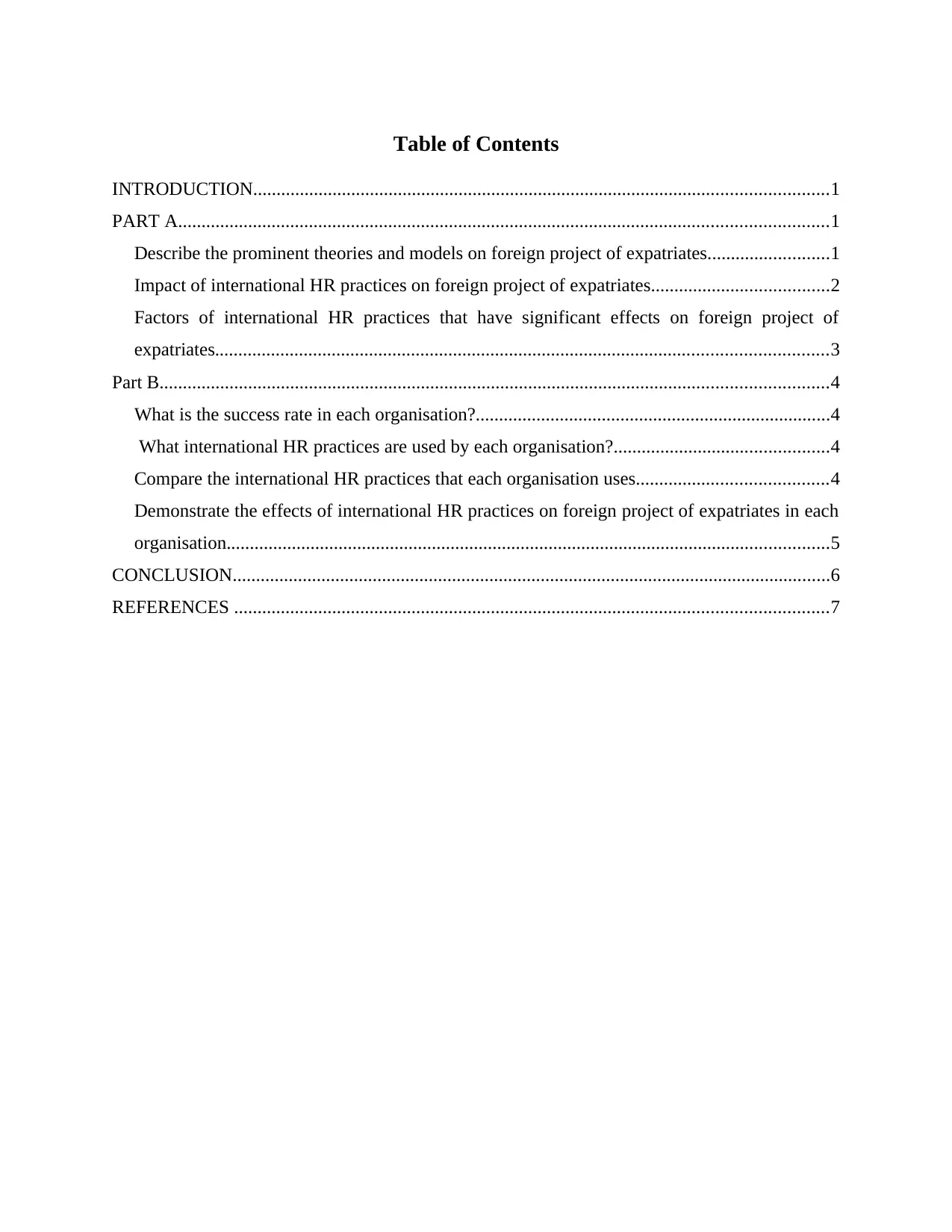
Table of Contents
INTRODUCTION...........................................................................................................................1
PART A...........................................................................................................................................1
Describe the prominent theories and models on foreign project of expatriates..........................1
Impact of international HR practices on foreign project of expatriates......................................2
Factors of international HR practices that have significant effects on foreign project of
expatriates...................................................................................................................................3
Part B...............................................................................................................................................4
What is the success rate in each organisation?............................................................................4
What international HR practices are used by each organisation?..............................................4
Compare the international HR practices that each organisation uses.........................................4
Demonstrate the effects of international HR practices on foreign project of expatriates in each
organisation.................................................................................................................................5
CONCLUSION................................................................................................................................6
REFERENCES ...............................................................................................................................7
INTRODUCTION...........................................................................................................................1
PART A...........................................................................................................................................1
Describe the prominent theories and models on foreign project of expatriates..........................1
Impact of international HR practices on foreign project of expatriates......................................2
Factors of international HR practices that have significant effects on foreign project of
expatriates...................................................................................................................................3
Part B...............................................................................................................................................4
What is the success rate in each organisation?............................................................................4
What international HR practices are used by each organisation?..............................................4
Compare the international HR practices that each organisation uses.........................................4
Demonstrate the effects of international HR practices on foreign project of expatriates in each
organisation.................................................................................................................................5
CONCLUSION................................................................................................................................6
REFERENCES ...............................................................................................................................7

⊘ This is a preview!⊘
Do you want full access?
Subscribe today to unlock all pages.

Trusted by 1+ million students worldwide
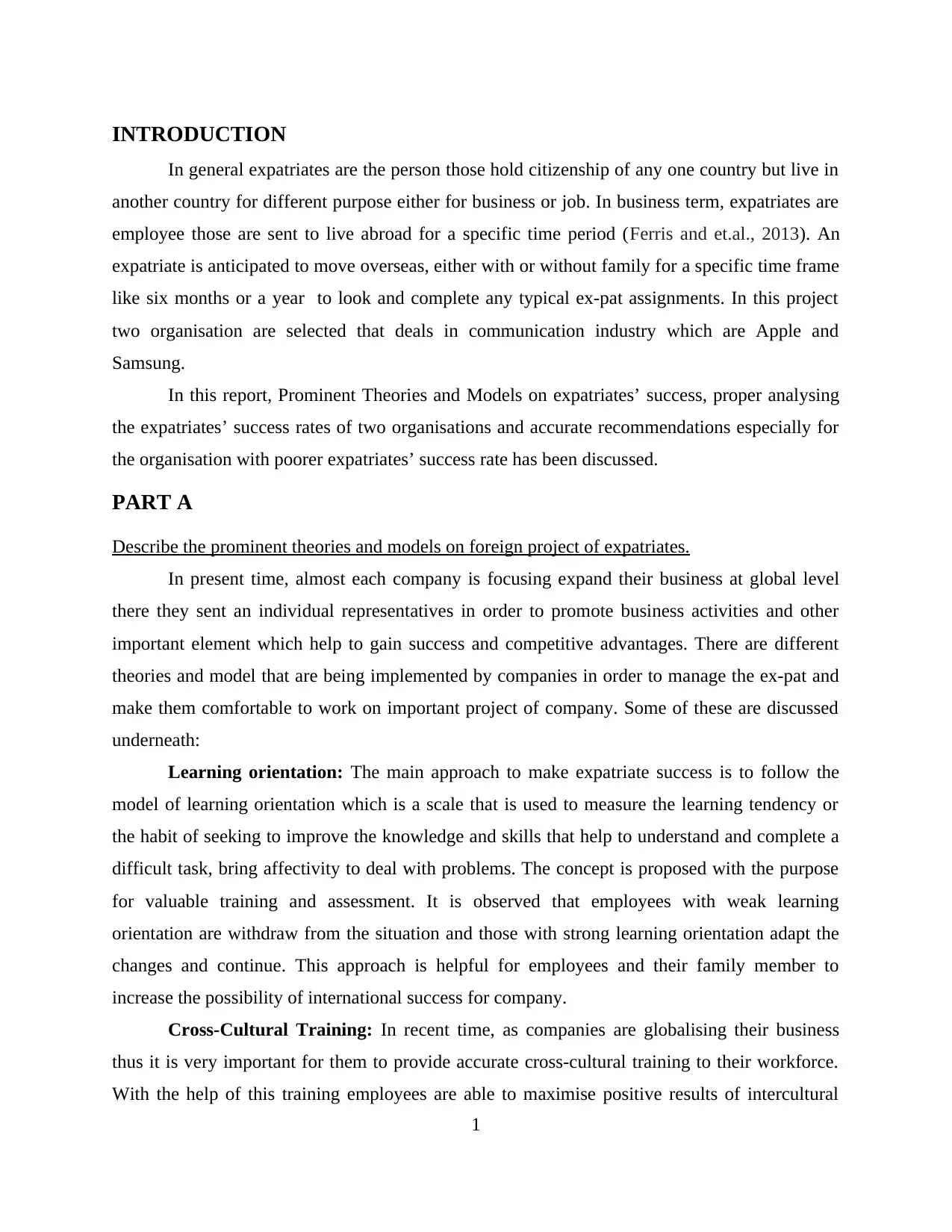
INTRODUCTION
In general expatriates are the person those hold citizenship of any one country but live in
another country for different purpose either for business or job. In business term, expatriates are
employee those are sent to live abroad for a specific time period (Ferris and et.al., 2013). An
expatriate is anticipated to move overseas, either with or without family for a specific time frame
like six months or a year to look and complete any typical ex-pat assignments. In this project
two organisation are selected that deals in communication industry which are Apple and
Samsung.
In this report, Prominent Theories and Models on expatriates’ success, proper analysing
the expatriates’ success rates of two organisations and accurate recommendations especially for
the organisation with poorer expatriates’ success rate has been discussed.
PART A
Describe the prominent theories and models on foreign project of expatriates.
In present time, almost each company is focusing expand their business at global level
there they sent an individual representatives in order to promote business activities and other
important element which help to gain success and competitive advantages. There are different
theories and model that are being implemented by companies in order to manage the ex-pat and
make them comfortable to work on important project of company. Some of these are discussed
underneath:
Learning orientation: The main approach to make expatriate success is to follow the
model of learning orientation which is a scale that is used to measure the learning tendency or
the habit of seeking to improve the knowledge and skills that help to understand and complete a
difficult task, bring affectivity to deal with problems. The concept is proposed with the purpose
for valuable training and assessment. It is observed that employees with weak learning
orientation are withdraw from the situation and those with strong learning orientation adapt the
changes and continue. This approach is helpful for employees and their family member to
increase the possibility of international success for company.
Cross‐Cultural Training: In recent time, as companies are globalising their business
thus it is very important for them to provide accurate cross‐cultural training to their workforce.
With the help of this training employees are able to maximise positive results of intercultural
1
In general expatriates are the person those hold citizenship of any one country but live in
another country for different purpose either for business or job. In business term, expatriates are
employee those are sent to live abroad for a specific time period (Ferris and et.al., 2013). An
expatriate is anticipated to move overseas, either with or without family for a specific time frame
like six months or a year to look and complete any typical ex-pat assignments. In this project
two organisation are selected that deals in communication industry which are Apple and
Samsung.
In this report, Prominent Theories and Models on expatriates’ success, proper analysing
the expatriates’ success rates of two organisations and accurate recommendations especially for
the organisation with poorer expatriates’ success rate has been discussed.
PART A
Describe the prominent theories and models on foreign project of expatriates.
In present time, almost each company is focusing expand their business at global level
there they sent an individual representatives in order to promote business activities and other
important element which help to gain success and competitive advantages. There are different
theories and model that are being implemented by companies in order to manage the ex-pat and
make them comfortable to work on important project of company. Some of these are discussed
underneath:
Learning orientation: The main approach to make expatriate success is to follow the
model of learning orientation which is a scale that is used to measure the learning tendency or
the habit of seeking to improve the knowledge and skills that help to understand and complete a
difficult task, bring affectivity to deal with problems. The concept is proposed with the purpose
for valuable training and assessment. It is observed that employees with weak learning
orientation are withdraw from the situation and those with strong learning orientation adapt the
changes and continue. This approach is helpful for employees and their family member to
increase the possibility of international success for company.
Cross‐Cultural Training: In recent time, as companies are globalising their business
thus it is very important for them to provide accurate cross‐cultural training to their workforce.
With the help of this training employees are able to maximise positive results of intercultural
1
Paraphrase This Document
Need a fresh take? Get an instant paraphrase of this document with our AI Paraphraser
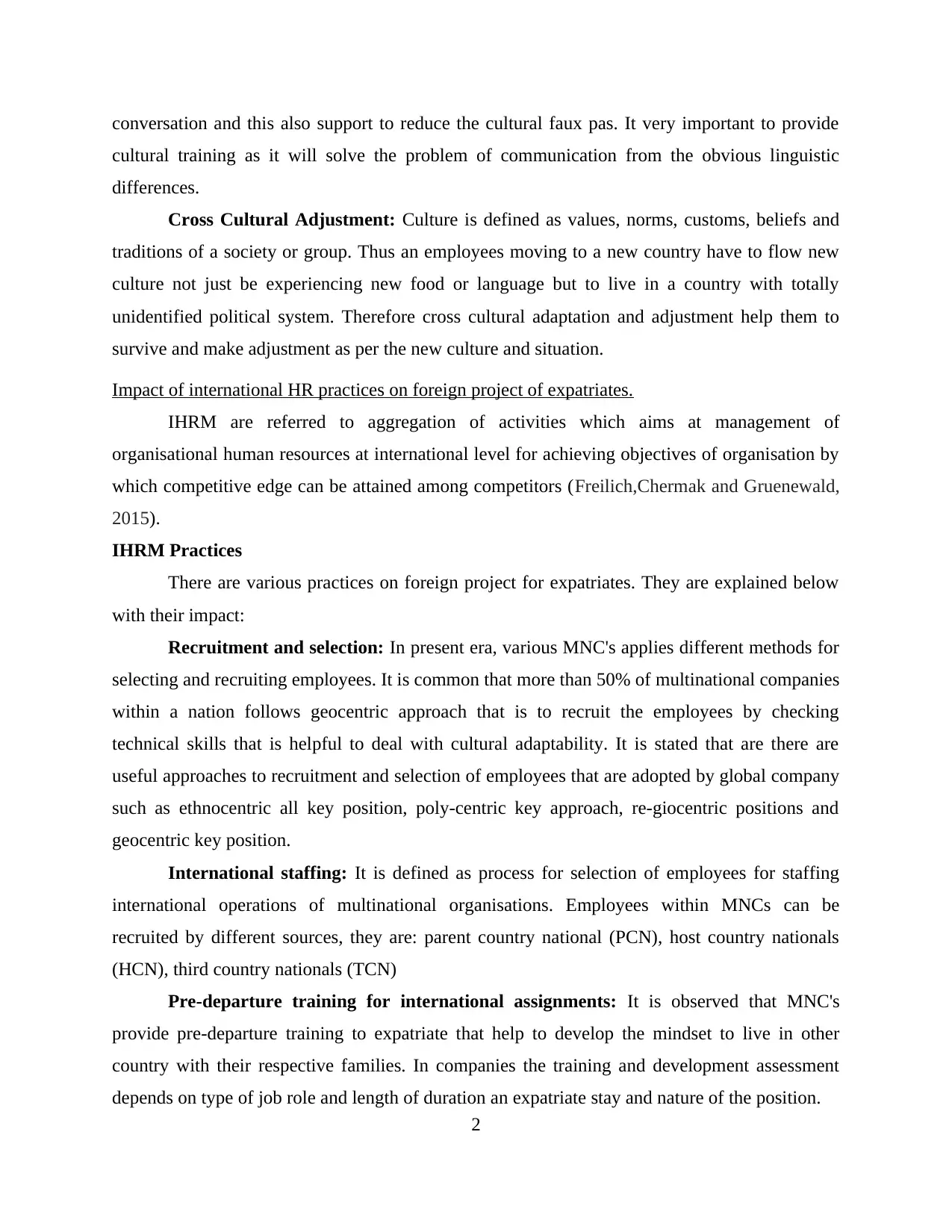
conversation and this also support to reduce the cultural faux pas. It very important to provide
cultural training as it will solve the problem of communication from the obvious linguistic
differences.
Cross Cultural Adjustment: Culture is defined as values, norms, customs, beliefs and
traditions of a society or group. Thus an employees moving to a new country have to flow new
culture not just be experiencing new food or language but to live in a country with totally
unidentified political system. Therefore cross cultural adaptation and adjustment help them to
survive and make adjustment as per the new culture and situation.
Impact of international HR practices on foreign project of expatriates.
IHRM are referred to aggregation of activities which aims at management of
organisational human resources at international level for achieving objectives of organisation by
which competitive edge can be attained among competitors (Freilich,Chermak and Gruenewald,
2015).
IHRM Practices
There are various practices on foreign project for expatriates. They are explained below
with their impact:
Recruitment and selection: In present era, various MNC's applies different methods for
selecting and recruiting employees. It is common that more than 50% of multinational companies
within a nation follows geocentric approach that is to recruit the employees by checking
technical skills that is helpful to deal with cultural adaptability. It is stated that are there are
useful approaches to recruitment and selection of employees that are adopted by global company
such as ethnocentric all key position, poly-centric key approach, re-giocentric positions and
geocentric key position.
International staffing: It is defined as process for selection of employees for staffing
international operations of multinational organisations. Employees within MNCs can be
recruited by different sources, they are: parent country national (PCN), host country nationals
(HCN), third country nationals (TCN)
Pre-departure training for international assignments: It is observed that MNC's
provide pre-departure training to expatriate that help to develop the mindset to live in other
country with their respective families. In companies the training and development assessment
depends on type of job role and length of duration an expatriate stay and nature of the position.
2
cultural training as it will solve the problem of communication from the obvious linguistic
differences.
Cross Cultural Adjustment: Culture is defined as values, norms, customs, beliefs and
traditions of a society or group. Thus an employees moving to a new country have to flow new
culture not just be experiencing new food or language but to live in a country with totally
unidentified political system. Therefore cross cultural adaptation and adjustment help them to
survive and make adjustment as per the new culture and situation.
Impact of international HR practices on foreign project of expatriates.
IHRM are referred to aggregation of activities which aims at management of
organisational human resources at international level for achieving objectives of organisation by
which competitive edge can be attained among competitors (Freilich,Chermak and Gruenewald,
2015).
IHRM Practices
There are various practices on foreign project for expatriates. They are explained below
with their impact:
Recruitment and selection: In present era, various MNC's applies different methods for
selecting and recruiting employees. It is common that more than 50% of multinational companies
within a nation follows geocentric approach that is to recruit the employees by checking
technical skills that is helpful to deal with cultural adaptability. It is stated that are there are
useful approaches to recruitment and selection of employees that are adopted by global company
such as ethnocentric all key position, poly-centric key approach, re-giocentric positions and
geocentric key position.
International staffing: It is defined as process for selection of employees for staffing
international operations of multinational organisations. Employees within MNCs can be
recruited by different sources, they are: parent country national (PCN), host country nationals
(HCN), third country nationals (TCN)
Pre-departure training for international assignments: It is observed that MNC's
provide pre-departure training to expatriate that help to develop the mindset to live in other
country with their respective families. In companies the training and development assessment
depends on type of job role and length of duration an expatriate stay and nature of the position.
2
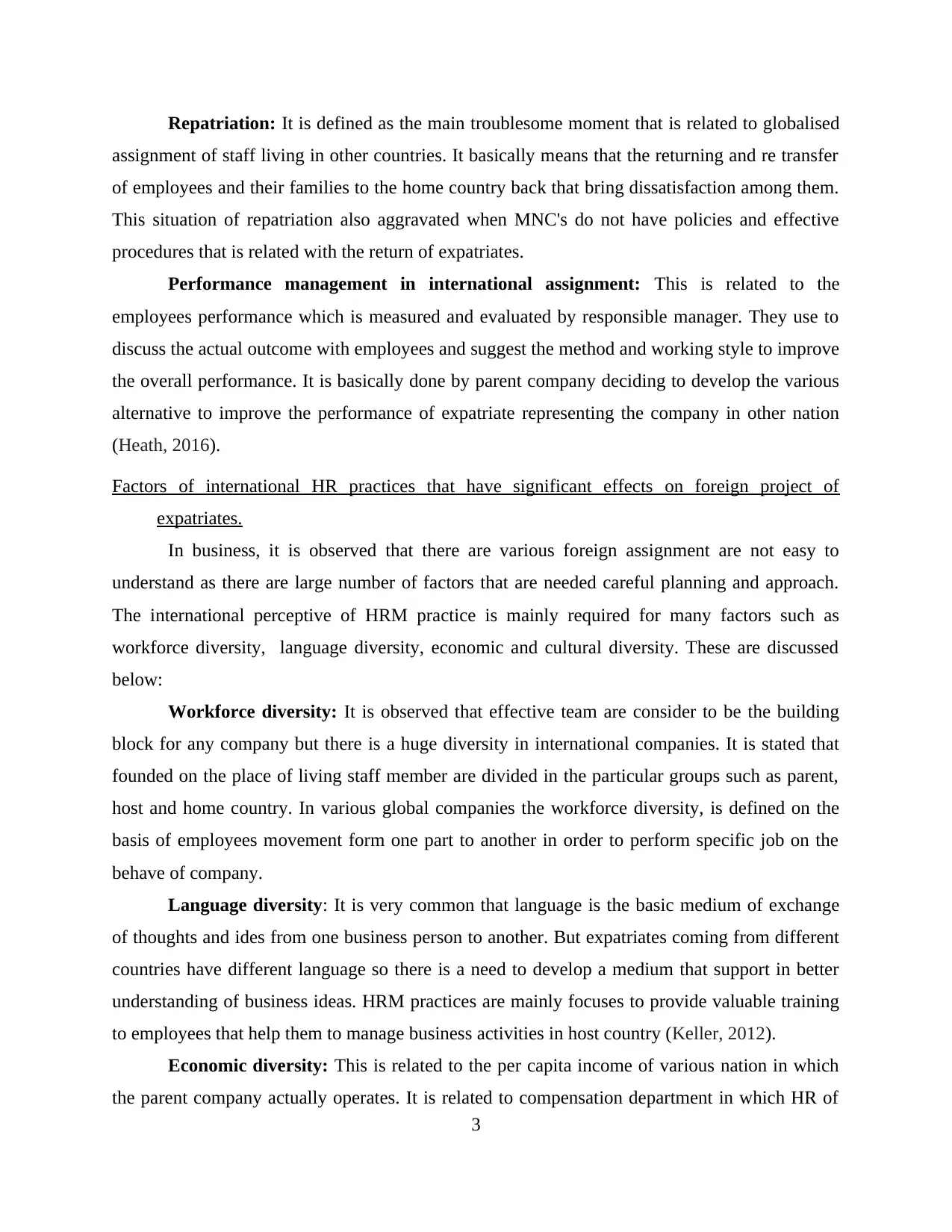
Repatriation: It is defined as the main troublesome moment that is related to globalised
assignment of staff living in other countries. It basically means that the returning and re transfer
of employees and their families to the home country back that bring dissatisfaction among them.
This situation of repatriation also aggravated when MNC's do not have policies and effective
procedures that is related with the return of expatriates.
Performance management in international assignment: This is related to the
employees performance which is measured and evaluated by responsible manager. They use to
discuss the actual outcome with employees and suggest the method and working style to improve
the overall performance. It is basically done by parent company deciding to develop the various
alternative to improve the performance of expatriate representing the company in other nation
(Heath, 2016).
Factors of international HR practices that have significant effects on foreign project of
expatriates.
In business, it is observed that there are various foreign assignment are not easy to
understand as there are large number of factors that are needed careful planning and approach.
The international perceptive of HRM practice is mainly required for many factors such as
workforce diversity, language diversity, economic and cultural diversity. These are discussed
below:
Workforce diversity: It is observed that effective team are consider to be the building
block for any company but there is a huge diversity in international companies. It is stated that
founded on the place of living staff member are divided in the particular groups such as parent,
host and home country. In various global companies the workforce diversity, is defined on the
basis of employees movement form one part to another in order to perform specific job on the
behave of company.
Language diversity: It is very common that language is the basic medium of exchange
of thoughts and ides from one business person to another. But expatriates coming from different
countries have different language so there is a need to develop a medium that support in better
understanding of business ideas. HRM practices are mainly focuses to provide valuable training
to employees that help them to manage business activities in host country (Keller, 2012).
Economic diversity: This is related to the per capita income of various nation in which
the parent company actually operates. It is related to compensation department in which HR of
3
assignment of staff living in other countries. It basically means that the returning and re transfer
of employees and their families to the home country back that bring dissatisfaction among them.
This situation of repatriation also aggravated when MNC's do not have policies and effective
procedures that is related with the return of expatriates.
Performance management in international assignment: This is related to the
employees performance which is measured and evaluated by responsible manager. They use to
discuss the actual outcome with employees and suggest the method and working style to improve
the overall performance. It is basically done by parent company deciding to develop the various
alternative to improve the performance of expatriate representing the company in other nation
(Heath, 2016).
Factors of international HR practices that have significant effects on foreign project of
expatriates.
In business, it is observed that there are various foreign assignment are not easy to
understand as there are large number of factors that are needed careful planning and approach.
The international perceptive of HRM practice is mainly required for many factors such as
workforce diversity, language diversity, economic and cultural diversity. These are discussed
below:
Workforce diversity: It is observed that effective team are consider to be the building
block for any company but there is a huge diversity in international companies. It is stated that
founded on the place of living staff member are divided in the particular groups such as parent,
host and home country. In various global companies the workforce diversity, is defined on the
basis of employees movement form one part to another in order to perform specific job on the
behave of company.
Language diversity: It is very common that language is the basic medium of exchange
of thoughts and ides from one business person to another. But expatriates coming from different
countries have different language so there is a need to develop a medium that support in better
understanding of business ideas. HRM practices are mainly focuses to provide valuable training
to employees that help them to manage business activities in host country (Keller, 2012).
Economic diversity: This is related to the per capita income of various nation in which
the parent company actually operates. It is related to compensation department in which HR of
3
⊘ This is a preview!⊘
Do you want full access?
Subscribe today to unlock all pages.

Trusted by 1+ million students worldwide
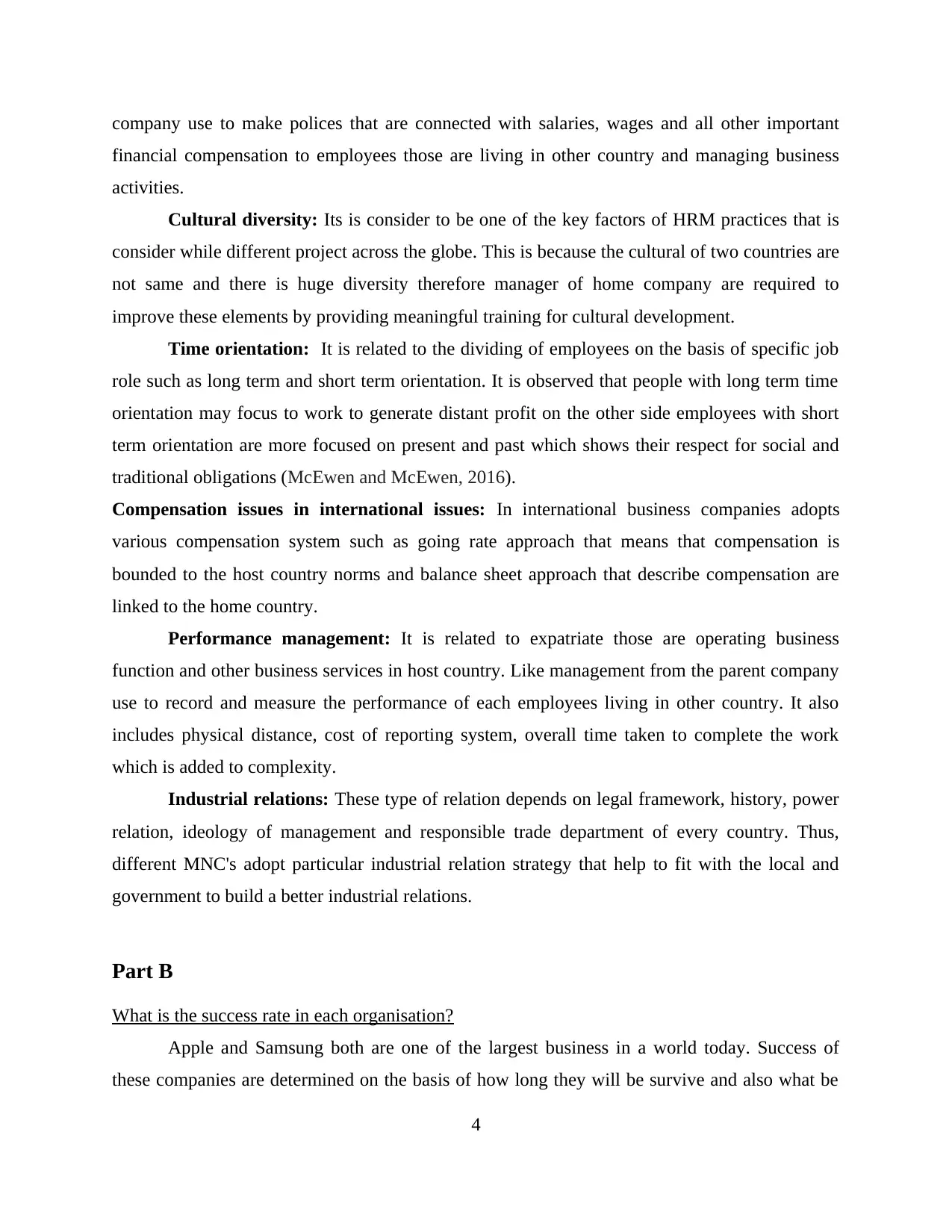
company use to make polices that are connected with salaries, wages and all other important
financial compensation to employees those are living in other country and managing business
activities.
Cultural diversity: Its is consider to be one of the key factors of HRM practices that is
consider while different project across the globe. This is because the cultural of two countries are
not same and there is huge diversity therefore manager of home company are required to
improve these elements by providing meaningful training for cultural development.
Time orientation: It is related to the dividing of employees on the basis of specific job
role such as long term and short term orientation. It is observed that people with long term time
orientation may focus to work to generate distant profit on the other side employees with short
term orientation are more focused on present and past which shows their respect for social and
traditional obligations (McEwen and McEwen, 2016).
Compensation issues in international issues: In international business companies adopts
various compensation system such as going rate approach that means that compensation is
bounded to the host country norms and balance sheet approach that describe compensation are
linked to the home country.
Performance management: It is related to expatriate those are operating business
function and other business services in host country. Like management from the parent company
use to record and measure the performance of each employees living in other country. It also
includes physical distance, cost of reporting system, overall time taken to complete the work
which is added to complexity.
Industrial relations: These type of relation depends on legal framework, history, power
relation, ideology of management and responsible trade department of every country. Thus,
different MNC's adopt particular industrial relation strategy that help to fit with the local and
government to build a better industrial relations.
Part B
What is the success rate in each organisation?
Apple and Samsung both are one of the largest business in a world today. Success of
these companies are determined on the basis of how long they will be survive and also what be
4
financial compensation to employees those are living in other country and managing business
activities.
Cultural diversity: Its is consider to be one of the key factors of HRM practices that is
consider while different project across the globe. This is because the cultural of two countries are
not same and there is huge diversity therefore manager of home company are required to
improve these elements by providing meaningful training for cultural development.
Time orientation: It is related to the dividing of employees on the basis of specific job
role such as long term and short term orientation. It is observed that people with long term time
orientation may focus to work to generate distant profit on the other side employees with short
term orientation are more focused on present and past which shows their respect for social and
traditional obligations (McEwen and McEwen, 2016).
Compensation issues in international issues: In international business companies adopts
various compensation system such as going rate approach that means that compensation is
bounded to the host country norms and balance sheet approach that describe compensation are
linked to the home country.
Performance management: It is related to expatriate those are operating business
function and other business services in host country. Like management from the parent company
use to record and measure the performance of each employees living in other country. It also
includes physical distance, cost of reporting system, overall time taken to complete the work
which is added to complexity.
Industrial relations: These type of relation depends on legal framework, history, power
relation, ideology of management and responsible trade department of every country. Thus,
different MNC's adopt particular industrial relation strategy that help to fit with the local and
government to build a better industrial relations.
Part B
What is the success rate in each organisation?
Apple and Samsung both are one of the largest business in a world today. Success of
these companies are determined on the basis of how long they will be survive and also what be
4
Paraphrase This Document
Need a fresh take? Get an instant paraphrase of this document with our AI Paraphraser
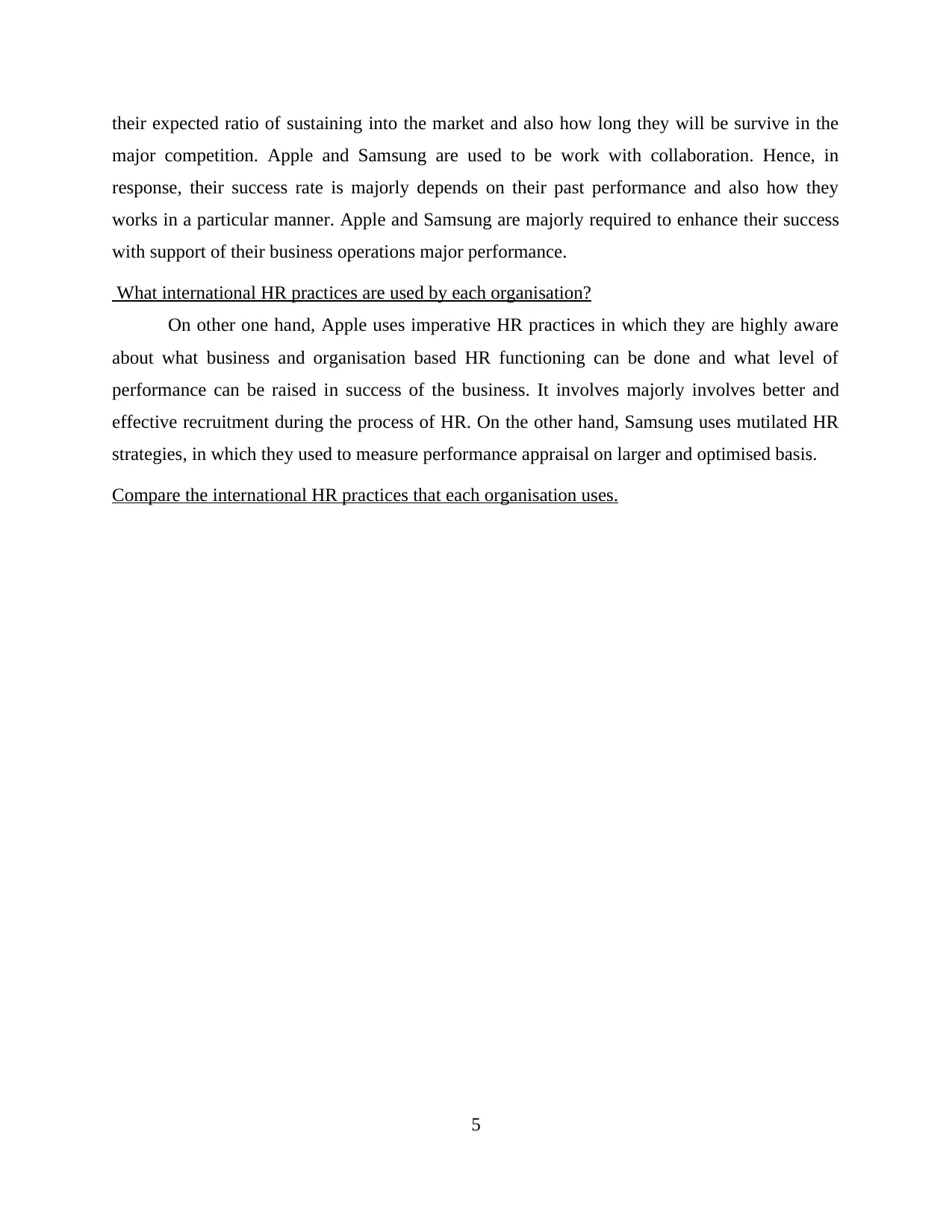
their expected ratio of sustaining into the market and also how long they will be survive in the
major competition. Apple and Samsung are used to be work with collaboration. Hence, in
response, their success rate is majorly depends on their past performance and also how they
works in a particular manner. Apple and Samsung are majorly required to enhance their success
with support of their business operations major performance.
What international HR practices are used by each organisation?
On other one hand, Apple uses imperative HR practices in which they are highly aware
about what business and organisation based HR functioning can be done and what level of
performance can be raised in success of the business. It involves majorly involves better and
effective recruitment during the process of HR. On the other hand, Samsung uses mutilated HR
strategies, in which they used to measure performance appraisal on larger and optimised basis.
Compare the international HR practices that each organisation uses.
5
major competition. Apple and Samsung are used to be work with collaboration. Hence, in
response, their success rate is majorly depends on their past performance and also how they
works in a particular manner. Apple and Samsung are majorly required to enhance their success
with support of their business operations major performance.
What international HR practices are used by each organisation?
On other one hand, Apple uses imperative HR practices in which they are highly aware
about what business and organisation based HR functioning can be done and what level of
performance can be raised in success of the business. It involves majorly involves better and
effective recruitment during the process of HR. On the other hand, Samsung uses mutilated HR
strategies, in which they used to measure performance appraisal on larger and optimised basis.
Compare the international HR practices that each organisation uses.
5
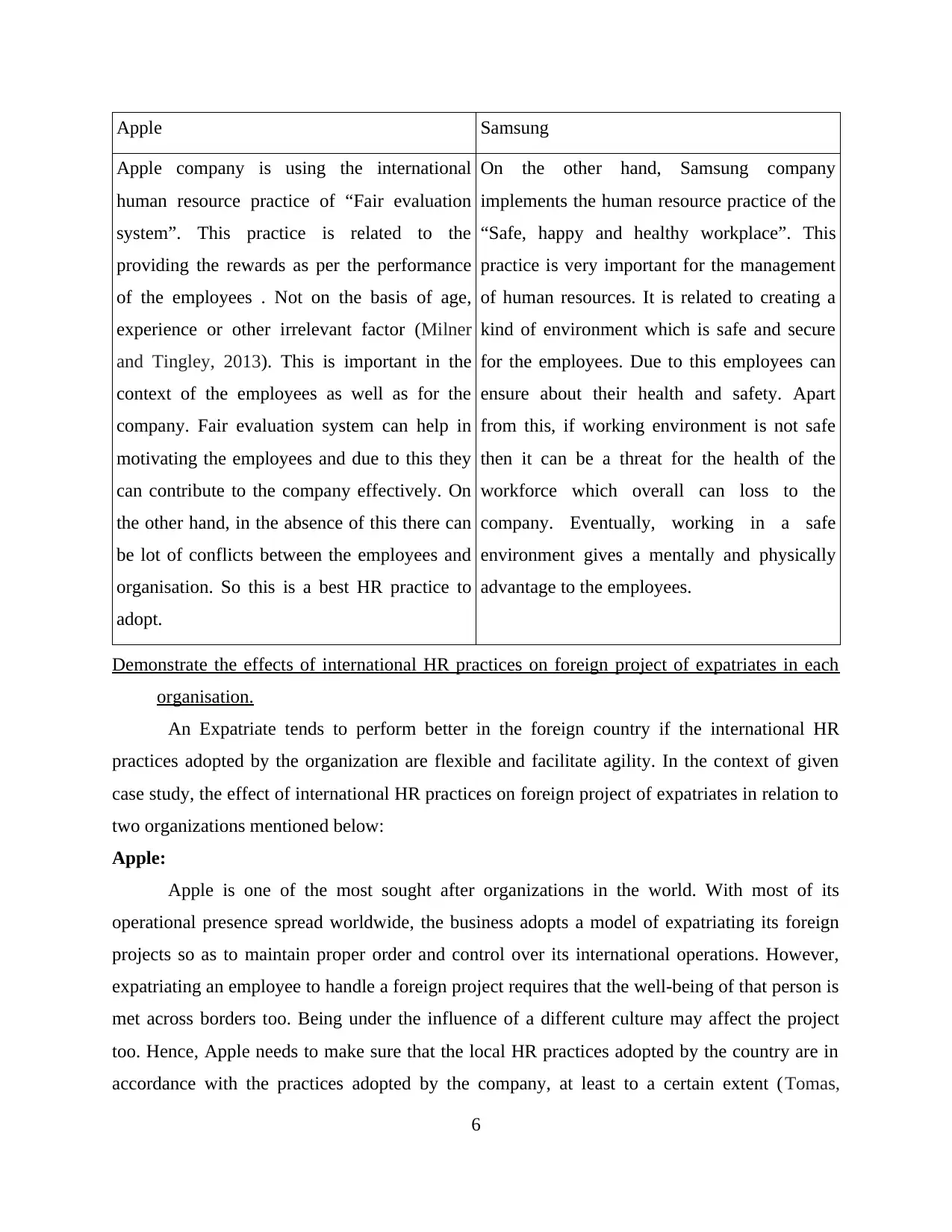
Apple Samsung
Apple company is using the international
human resource practice of “Fair evaluation
system”. This practice is related to the
providing the rewards as per the performance
of the employees . Not on the basis of age,
experience or other irrelevant factor (Milner
and Tingley, 2013). This is important in the
context of the employees as well as for the
company. Fair evaluation system can help in
motivating the employees and due to this they
can contribute to the company effectively. On
the other hand, in the absence of this there can
be lot of conflicts between the employees and
organisation. So this is a best HR practice to
adopt.
On the other hand, Samsung company
implements the human resource practice of the
“Safe, happy and healthy workplace”. This
practice is very important for the management
of human resources. It is related to creating a
kind of environment which is safe and secure
for the employees. Due to this employees can
ensure about their health and safety. Apart
from this, if working environment is not safe
then it can be a threat for the health of the
workforce which overall can loss to the
company. Eventually, working in a safe
environment gives a mentally and physically
advantage to the employees.
Demonstrate the effects of international HR practices on foreign project of expatriates in each
organisation.
An Expatriate tends to perform better in the foreign country if the international HR
practices adopted by the organization are flexible and facilitate agility. In the context of given
case study, the effect of international HR practices on foreign project of expatriates in relation to
two organizations mentioned below:
Apple:
Apple is one of the most sought after organizations in the world. With most of its
operational presence spread worldwide, the business adopts a model of expatriating its foreign
projects so as to maintain proper order and control over its international operations. However,
expatriating an employee to handle a foreign project requires that the well-being of that person is
met across borders too. Being under the influence of a different culture may affect the project
too. Hence, Apple needs to make sure that the local HR practices adopted by the country are in
accordance with the practices adopted by the company, at least to a certain extent (Tomas,
6
Apple company is using the international
human resource practice of “Fair evaluation
system”. This practice is related to the
providing the rewards as per the performance
of the employees . Not on the basis of age,
experience or other irrelevant factor (Milner
and Tingley, 2013). This is important in the
context of the employees as well as for the
company. Fair evaluation system can help in
motivating the employees and due to this they
can contribute to the company effectively. On
the other hand, in the absence of this there can
be lot of conflicts between the employees and
organisation. So this is a best HR practice to
adopt.
On the other hand, Samsung company
implements the human resource practice of the
“Safe, happy and healthy workplace”. This
practice is very important for the management
of human resources. It is related to creating a
kind of environment which is safe and secure
for the employees. Due to this employees can
ensure about their health and safety. Apart
from this, if working environment is not safe
then it can be a threat for the health of the
workforce which overall can loss to the
company. Eventually, working in a safe
environment gives a mentally and physically
advantage to the employees.
Demonstrate the effects of international HR practices on foreign project of expatriates in each
organisation.
An Expatriate tends to perform better in the foreign country if the international HR
practices adopted by the organization are flexible and facilitate agility. In the context of given
case study, the effect of international HR practices on foreign project of expatriates in relation to
two organizations mentioned below:
Apple:
Apple is one of the most sought after organizations in the world. With most of its
operational presence spread worldwide, the business adopts a model of expatriating its foreign
projects so as to maintain proper order and control over its international operations. However,
expatriating an employee to handle a foreign project requires that the well-being of that person is
met across borders too. Being under the influence of a different culture may affect the project
too. Hence, Apple needs to make sure that the local HR practices adopted by the country are in
accordance with the practices adopted by the company, at least to a certain extent (Tomas,
6
⊘ This is a preview!⊘
Do you want full access?
Subscribe today to unlock all pages.

Trusted by 1+ million students worldwide
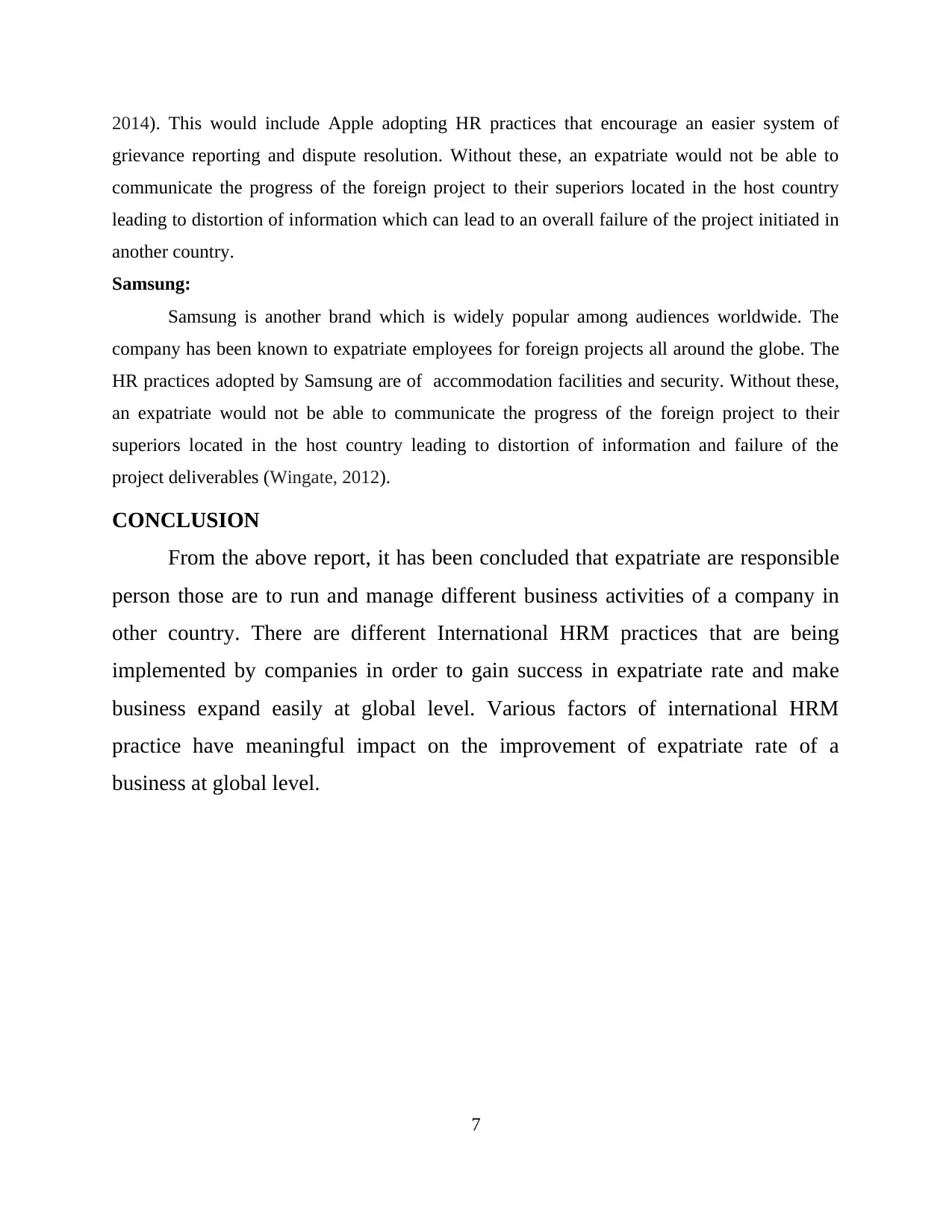
2014). This would include Apple adopting HR practices that encourage an easier system of
grievance reporting and dispute resolution. Without these, an expatriate would not be able to
communicate the progress of the foreign project to their superiors located in the host country
leading to distortion of information which can lead to an overall failure of the project initiated in
another country.
Samsung:
Samsung is another brand which is widely popular among audiences worldwide. The
company has been known to expatriate employees for foreign projects all around the globe. The
HR practices adopted by Samsung are of accommodation facilities and security. Without these,
an expatriate would not be able to communicate the progress of the foreign project to their
superiors located in the host country leading to distortion of information and failure of the
project deliverables (Wingate, 2012).
CONCLUSION
From the above report, it has been concluded that expatriate are responsible
person those are to run and manage different business activities of a company in
other country. There are different International HRM practices that are being
implemented by companies in order to gain success in expatriate rate and make
business expand easily at global level. Various factors of international HRM
practice have meaningful impact on the improvement of expatriate rate of a
business at global level.
7
grievance reporting and dispute resolution. Without these, an expatriate would not be able to
communicate the progress of the foreign project to their superiors located in the host country
leading to distortion of information which can lead to an overall failure of the project initiated in
another country.
Samsung:
Samsung is another brand which is widely popular among audiences worldwide. The
company has been known to expatriate employees for foreign projects all around the globe. The
HR practices adopted by Samsung are of accommodation facilities and security. Without these,
an expatriate would not be able to communicate the progress of the foreign project to their
superiors located in the host country leading to distortion of information and failure of the
project deliverables (Wingate, 2012).
CONCLUSION
From the above report, it has been concluded that expatriate are responsible
person those are to run and manage different business activities of a company in
other country. There are different International HRM practices that are being
implemented by companies in order to gain success in expatriate rate and make
business expand easily at global level. Various factors of international HRM
practice have meaningful impact on the improvement of expatriate rate of a
business at global level.
7
Paraphrase This Document
Need a fresh take? Get an instant paraphrase of this document with our AI Paraphraser
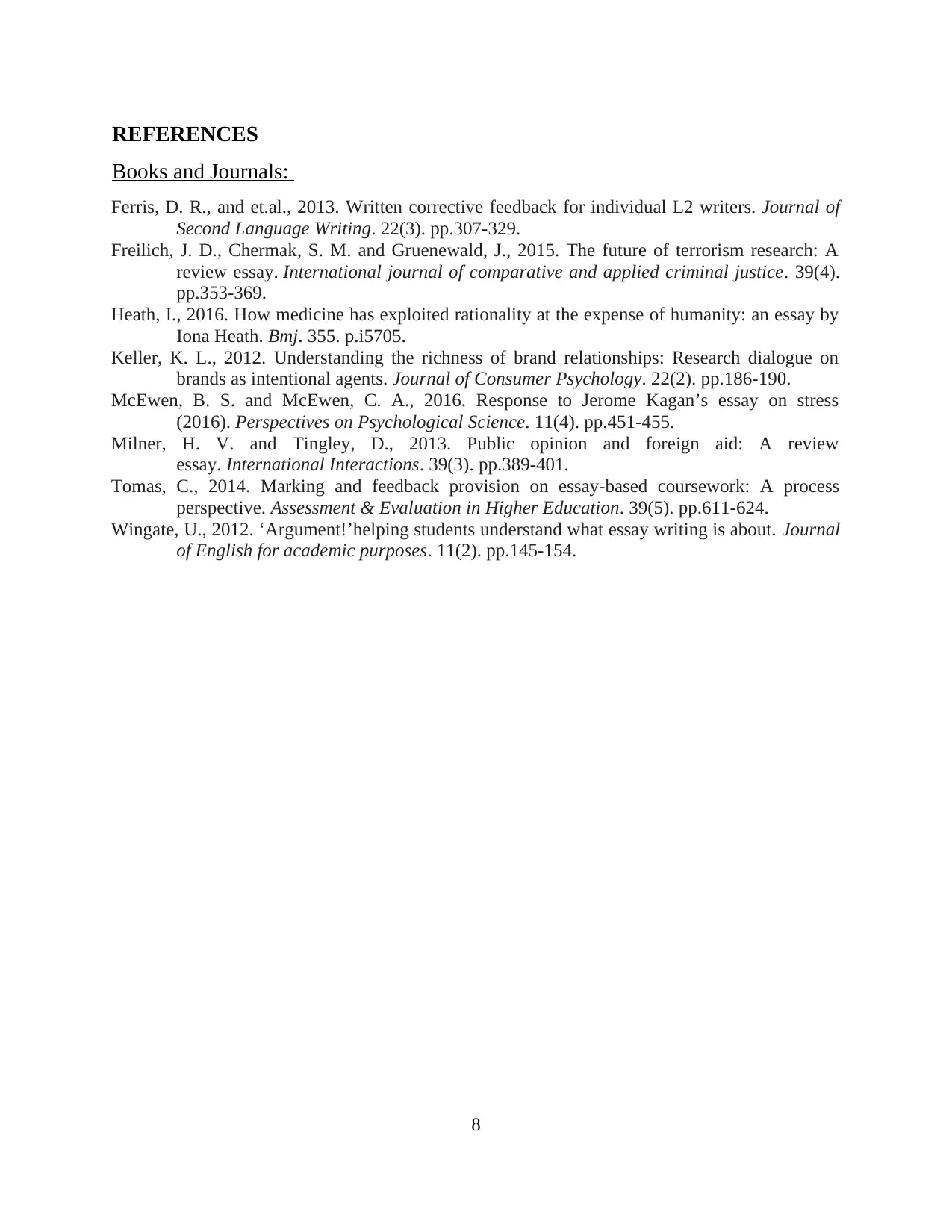
REFERENCES
Books and Journals:
Ferris, D. R., and et.al., 2013. Written corrective feedback for individual L2 writers. Journal of
Second Language Writing. 22(3). pp.307-329.
Freilich, J. D., Chermak, S. M. and Gruenewald, J., 2015. The future of terrorism research: A
review essay. International journal of comparative and applied criminal justice. 39(4).
pp.353-369.
Heath, I., 2016. How medicine has exploited rationality at the expense of humanity: an essay by
Iona Heath. Bmj. 355. p.i5705.
Keller, K. L., 2012. Understanding the richness of brand relationships: Research dialogue on
brands as intentional agents. Journal of Consumer Psychology. 22(2). pp.186-190.
McEwen, B. S. and McEwen, C. A., 2016. Response to Jerome Kagan’s essay on stress
(2016). Perspectives on Psychological Science. 11(4). pp.451-455.
Milner, H. V. and Tingley, D., 2013. Public opinion and foreign aid: A review
essay. International Interactions. 39(3). pp.389-401.
Tomas, C., 2014. Marking and feedback provision on essay-based coursework: A process
perspective. Assessment & Evaluation in Higher Education. 39(5). pp.611-624.
Wingate, U., 2012. ‘Argument!’helping students understand what essay writing is about. Journal
of English for academic purposes. 11(2). pp.145-154.
8
Books and Journals:
Ferris, D. R., and et.al., 2013. Written corrective feedback for individual L2 writers. Journal of
Second Language Writing. 22(3). pp.307-329.
Freilich, J. D., Chermak, S. M. and Gruenewald, J., 2015. The future of terrorism research: A
review essay. International journal of comparative and applied criminal justice. 39(4).
pp.353-369.
Heath, I., 2016. How medicine has exploited rationality at the expense of humanity: an essay by
Iona Heath. Bmj. 355. p.i5705.
Keller, K. L., 2012. Understanding the richness of brand relationships: Research dialogue on
brands as intentional agents. Journal of Consumer Psychology. 22(2). pp.186-190.
McEwen, B. S. and McEwen, C. A., 2016. Response to Jerome Kagan’s essay on stress
(2016). Perspectives on Psychological Science. 11(4). pp.451-455.
Milner, H. V. and Tingley, D., 2013. Public opinion and foreign aid: A review
essay. International Interactions. 39(3). pp.389-401.
Tomas, C., 2014. Marking and feedback provision on essay-based coursework: A process
perspective. Assessment & Evaluation in Higher Education. 39(5). pp.611-624.
Wingate, U., 2012. ‘Argument!’helping students understand what essay writing is about. Journal
of English for academic purposes. 11(2). pp.145-154.
8
1 out of 11
Related Documents
Your All-in-One AI-Powered Toolkit for Academic Success.
+13062052269
info@desklib.com
Available 24*7 on WhatsApp / Email
![[object Object]](/_next/static/media/star-bottom.7253800d.svg)
Unlock your academic potential
Copyright © 2020–2026 A2Z Services. All Rights Reserved. Developed and managed by ZUCOL.




